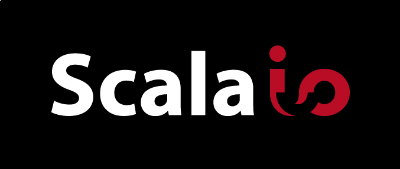 As you might have noticed, I’m a .NET guy. I work on a Microsoft platform, with almost only Microsoft tools. But I happen to also be a functional programming fanboy now. My main interest is in F#, but I’m also curious about many other platforms…
As you might have noticed, I’m a .NET guy. I work on a Microsoft platform, with almost only Microsoft tools. But I happen to also be a functional programming fanboy now. My main interest is in F#, but I’m also curious about many other platforms…
Last year, I took Martin Odersky’s Scala course on coursera, and enjoyed it. I also watched the whole series of Haskell lectures by Erik Meijer on Channel9. And in a week, for my birthday, both of them offer me a new “Reactive programming in Scala” course on coursera!
With all this background, I went last week to Scala.io, a brand new conference in Paris, mostly about Scala, but also other functional languages. As a not-working-on-the-JVM guy, and not using Scala in my work, I was not focused on tools and practical uses of Scala, but rather on getting ideas from a wide range of practices and languages, and interoperability in mind. As you’ll see, I chose a polyglot track.
I’ve attended several talks during the two days, but I won’t go into the details of each of these. All the videos should be available soon, so if any of these talks seem interesting to you, watch them!
Keynote day 1, Victor Klang
The opening keynote, given by Victor Klang, head of engineering at Typesafe, focused on the importance of failure, and the need to embrace validation and error handling as part of the software. He envisioned a world of micro-services, concurrent and compartmentalized, location transparent: typed endpoints producing typed streams of data. Of course, he insisted on the importance of type-safety…
ZeroMQ and Scala, François Armand
ZeroMQ is a reaction to Message Oriented Middlewares, and the AMQP protocol, which took ages to be specified. ZeroMQ is not a MOM, it is a socket library acting as a concurrency framework. Is is asynchronous and scalable, and has numerous languages integrations. For this reason, it is a convenient communication channel between heterogeneous systems. The talk presented several demos of different communication patterns, using both Scala (with or without Akka) and Python.
SPL: Scala Powered Lisp, Stefan Chris
This talk was about a project to parse and interpret a LISP is Scala. Its goal was to show how parser combinators could be used in Scala to build an AST, and how to build an interpreter and a REPL on top of it.
After a quick intro about Lisp, and sample expressions evaluated in a REPL, Stefan showed us the definitions of the basic data types of the language, and the Lisp AST he had built. In Scala, all the types were represented as case classes, that can be pattern-matched. After showing the basic constructs, he moved on to anonymous functions, bindings, and more complex expressions. Then came the interpreter, environment and closures.
Lazy on a Thursday afternoon
During the afternoon, I saw some Clojure (I wasn’t that impressed, I should see another more advanced talk some time), reified trees sent to the GPU, JVM Garbage Collection theory and tuning, and then came…
Brain damage with Haskell, Yves Parès
This talk was a general presentation about Haskell, accelerated. It was a very nice talk, first focusing on the non-strict evaluation model of Haskell, where the evaluation is in the hands of the programmer. Yves then showed us several standard functions, and… finally introduced the classical vocabulary of Haskell developers: functors, applicatives, monad. He finally presented several monads usage: IO monad, state monad.
And after some more Scala patterns, and a nice evening party with the attendees and speakers…
Keynote day 2, Sadek Drobi
This keynote was about web modern challenges, and the motivations behind the Play2 framework. To sum up, Play2 is about composability and functional programming toolset. This really seems to be a pretty nice framework.
Functional groovy, Guillaume Laforge
This was a very nice talk! I had never taken the time to look at Groovy, well this is now solved. Groovy is a superset of Java with APIs and toolset. It is a great fit for DSLs, and offers a seamless integration with Java. It has many functional characteristics: closures are first-class citizens, it supports genericity through duck-typing and operator overloading.
A very clever feature is the ability to write the last argument of a function, if it is a closure, after the closing parenthesis of the function call. This brings a very nice syntax. Groovy also supports transformations (macros), which allows to automatically add behaviors such a structural equality or memoization to existing code. It’s definitely worth a look.
Several other talks
I attended a talk about Gatling2, a stress test tool that builds a DSL on top of Scala, a talk about Scalaz and Shapeless, Nicolas Martignole talking about his experience working in a startup, and finally Fabrice Croiseaux talking about an app combining Scala, Akka and Backbone for a reactive web application. I have really enjoyed all these talks, but I won’t go into the details of each of these.
And a conclusion!
These two days were really nice, there are so many new things I want to learn now… I was already playing with parser combinators in F#, I only want to play with them even more. I am also going to look at structures such as HLists. And of course, reactive programming in Scala.
I really think that it is when we cross boundaries and go outside of our comfort zone that real useful exchanges are made. I had a good time at Scala.io and hope to be there again next year, maybe even doing a talk about F#!


